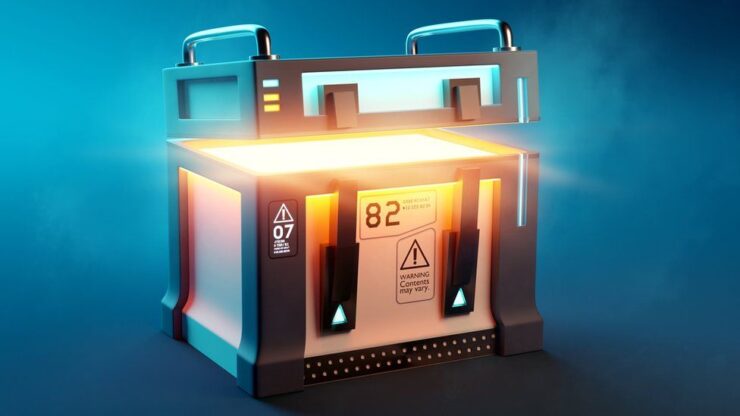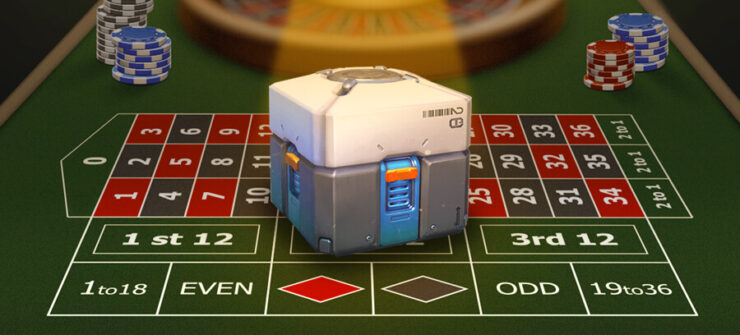There is not a single gamer in the entire globe who is unfamiliar with exactly what a loot box is, without a doubt. Many players are drawn in by the chance to acquire the item in a video game, as well as tearfully open it.
By 2025, loot boxes will produce $20 billion, claims New Musical Express. The total is impressive, but recent regulatory developments in some European nations suggest that it will not actually happen.
Let us examine the idea of loot boxes in the realm of gaming, the draw they have for players, and determine whether they will be present in video games at all in the near future.
An Explanation of Loot Boxes

It is essential to start out with a thorough description of what a loot box comprises.
A loot box, occasionally referred to as a prize crate, is a digital object that can be purchased in video games that grants access to a variety of loot. It is important to note that because the content of the box is randomized, users have no idea exactly what they will receive
The following is a list of rewards that gamers can obtain by opening loot boxes:
- modification of the avatar;
- character customization;
- skins of different kinds;
- weapon;
- armor;
There is more to it, of course; in general, there is a large variety of goods available through treasure boxes. They may have varying worth and have an impact on how the game is played. The most challenging virtual objects to acquire are the rarest. In certain games, they are marked with a specific hue to highlight their distinctiveness to players. For instance, easy-finding objects are represented by gray, not-so-rare items in blue, and super-rare ones in orange.
There are quirks to the “box with surprise” opening. The majority of the time, game makers make it captivating and appealing for gamers. For instance, it can be performed with audio and visual effects, which heighten the anticipation and excitement of the procedure.
Loot boxes are viewed as a method of in-game revenue generation. It is important to note that these can be awarded to players as a prize for successfully completing a level or for character advancement. Loot boxes can also be acquired by stream-watching by gamers. Players can purchase such a box in addition to using free methods to open it. Numerous issues with this approach will be covered in more detail in this essay.
It is hardly unexpected that loot boxes are one of the primary methods of revenue generation for many game development teams. Many players are drawn to the urge to possess a digital object that can alter gameplay or enhance a character’s appearance.
Loot boxes have been used in the following games, which are notable examples yet do not represent a whole collection of titles offering these little “gifts”:
- Dota 2;
- League of Legends;
- Call of Duty;
- Overwatch;
- FIFA;
- Roblox;
Overwatch and Loot Boxes
As an illustration, let us use the Overwatch loot box.
Players in this game can acquire player icons, character cinematic animations, skins, emotes, sprays, victory postures, audio elements, and even gold, which they can use to purchase additional personalization options.
Do Loot Boxes Count as Gambling?

The relationship between loot boxes and gambling is heavily debated in the gaming and regulatory verticals. Since different jurisdictions have varied perspectives on this idea, it is a very contentious subject. Furthermore, different regulatory authorities around the world have different definitions of prize crates.
One thing is clear: Loot boxes are a growing source of controversy since minors, who make up the majority of the user base for video games having them, find this kind of monetization particularly appealing.
Let us take a deeper look at the jurisdictions in Europe that, based on current legislation, may soon treat loot boxes as gambling.
The UK
Undoubtedly among the nations who have “waged war” against loot boxes is Great Britain. It is important to note that one in three UK players enjoy loot boxes and are willing to spend money on them weekly, according to Forbes. Prize boxes became more popular as a result of the unique COVID-19 epidemic, leading to higher sales than in prior years. Outdoor activities were effectively replaced by video games, and loot boxes were found to be the ideal source of excitement.
Close to 50% of players admitted that they had begun to spend more money on unlocking loot boxes than they did before the shutdown, Op Attack disclosed. Additionally, this trend affects players who use smartphones, PCs, and video gaming consoles, among other platforms.
However, a survey done in the UK reveals that not every UK resident has a favorable opinion of wasting cash on loot boxes. As a result, nearly 70% of respondents believe that they promote gambling, endangering minors. A restriction on the amount that can be spent on these games’ microtransactions should be implemented, according to nearly half of the survey respondents; 19% favor a total outlawing of prize crates.
While the government of the United Kingdom does everything in its power to swoop down on loot boxes, specifically when it comes to the younger age, game companies still have reason to be happy about sales. These worries are supported by a wide range of studies. For instance, a report by GambleAware from April 2021 said that 5% of all purchased loot boxes accounted for 50% of the overall money made by this industry. These players often spend $100 or less per month on these kinds of products. A third of these buyers exhibit symptoms of gambling addiction.
This made it possible for GambleAware to compare loot boxes to problematic gambling. Open prize boxes and gambling are related, according to research from the universities of Wolverhampton and Plymouth. It has come to light that loot boxes share psychological characteristics with gambling. Out of 13 surveys, only one failed to find these data to be true.
Of course, buying loot boxes can be detrimental. The researchers identified two different categories of harm:
- One of the main causes of the predilection for loot boxes’ potential harmful impacts is financial. Some players are willing to spend more money on this pleasure, even if the majority of players only spend small amounts of money on purchasing prized boxes containing random objects.
- It is important to note that purchasing reward crates is psychologically related to both a happy and a negative player’s mood. Studies have also demonstrated that these purchases might both cause and contribute to mental health issues.
The information from GambleAware’s report might be used once more when discussing the reasons behind such purchases.
The following are the primary justifications for purchasing loot boxes:
- the anticipation of opening;
- fear of missing out on a chance;
- advertisements’ and promotions’ impact;
- compulsion;
- content value;
- getting respect from fellow gamers;
- socializing;
- boredom;
- urge to purchase;
Of course, the fundamental issue continues to be kids’ curiosity about treasure boxes. According to the Children’s Commissioner for England, 93% of kids in Great Britain regularly play video games, with 25–40% of them paying for access to loot boxes. The Gambling Health Alliance (GHA), which reported that about 15% of minors utilize their parents’ money to make in-game purchases, has provided evidence to support this claim. Additionally, kids shop even when adults do not let them.
In reality, the UK government used the aforementioned facts as the foundation for their response to the loot box issue. Anne Longfield, the Children’s Commissioner, suggested last year that rules be put in place and that loot boxes be labeled as gambling. She has said that they ought to be promptly included in the Gambling Act’s regulatory regulations.
The British government started a public survey earlier in 2020 to find out what the people of that nation thought about loot boxes. UK citizens were given the chance to voice their opinions on these in-game purchases. Opinions, both favorable and negative, were welcomed.
The Department for Digital, Culture, Media and Sport (DCMS) released the findings of the stakeholder consultation (held among game production companies, publishers, addiction specialists, etc.) in July 2021. The form of regulation that ought to be enforced on loot boxes has received 30,000 opinions. The government agency first made a commitment to include prize crates in the revised Gambling Act. Later on, though, it withdrew from those commitments, claiming that it was first required to determine the government’s strategy. The UK government handles the issue of loot boxes seriously, according to the DCMS spokespeople. The Department will keep researching the responses it has received to find more solutions.
Belgium

Another country whose government is attempting to establish a correlation between loot boxes and gambling is Belgium. The existence of loot boxes in video games is against the law, according to the Belgian Gaming Commission’s statement from a few years back. According to the Justice Minister, it is harmful to combine gambling and video games, especially for younger audiences.
Following the findings, the Gaming Commission mandated the complete removal of all real money-transactional loot boxes. These game production companies were told that failing to comply with the criteria could result in them paying hefty fines (€800,000).
What has transpired since the prohibition, then? Due to the numerous contentious issues that needed to be addressed, the story did not stop there. Initially, it was looked into what Belgian players thought of the prohibition. Many players, according to certain sources, have backed the choice because they believe loot boxes unfairly treat users who choose not to purchase them.
It should go without saying that corporations that create video games opposed the new legislation. Here, a genuine war began. For instance, Electronic Arts (EA) made every effort to demonstrate that paid boxes and gambling are completely unrelated. The well-known corporation chose to give this method of monetization a new moniker, referring to it as “surprise mechanics” and likening it to Kinder Surprise eggs. In addition, players who succeed in games are awarded prize crates. Due to this, EA may once again be allowed to provide loot boxes to players in Belgium, despite all of the accusations. Many players were happy to see the reintroduction of even a modest chance to take pleasure in opening loot boxes once more, according to several industry insiders.
The Netherlands
Video games were the focus of a Kansspelautoriteit (KSA – Dutch Gaming Authority) investigation in 2018, which revealed that certain versions of the games contravene gambling laws. The KSA said that loot box profits were random, but the purchased items could be exchanged for other items on outside websites. This supports the notion that the things in these boxes are related to gambling because they have a real money value.
Loot boxes were outlawed in the Netherlands a few years later. Once more, Electronic Arts took the leading role in this scenario. The Dutch lawmakers were interested in EA’s FIFA Ultimate Team. If the video game firm continued to provide loot boxes, it would face a €5 million penalty. The corporation was required to pay the punishment after a Dutch court found it guilty of breaking the law that same year. EA responded by contesting the court’s decision and arguing that its prize-filled crates were worthless. They are a crucial component of the game, which aims to allow players to demonstrate their footballing prowess virtually.
The Dutch court issued a final decision finding that EA’s loot boxes do indeed have monetary value because gamers can trade and buy in-game items on various other sites, such as perfectly legal and prominent bookmakers by the link where visitors can bet using loot aboxes and skins. The same scenario, for instance, applies to the sale of Dota 2 items.
Details Regarding the Epic Games Loot Box Settlement

Another intriguing instance of the way video game makers can be penalized for providing loot boxes is the case of Epic Games. The US gamers recently sued the corporation in a class action lawsuit, claiming that it had violated their rights as consumers. The corporation was accused of manipulating minor players and encouraging them to play for luck in the users’ complaints.
The case involved video games like Fortnite and Rocket League. Users will receive reimbursement from Epic Games. Thus, if they purchased Fortnite: Save the World loot boxes, players received 1000 V-Bucks. Fans of Rocket League who bought loot boxes also received 1,000 credits. Regarding US consumers, Epic Games stated that around three million Rocket League gamers and over six and a half million players of Fortnite would receive payouts in virtual currency. The company offered to return actual money to kids who used their parents’ cash for such purchases alongside digital transactions. The refund may not, however, be greater than $50.
In the expanding field of gaming and digital entertainment, the subject of loot boxes is still up for debate. A good deal of governments and regulatory authorities view it as a service akin to gambling and risk for kids, despite the fact that perspectives on it vary. Concurrently, gamers all across the world expend money on loot boxes while experiencing the thrill of anticipation that comes with opening them. The key concern here is how to safeguard children and people who exhibit signs of addiction from playing video games and cannot stop buying loot boxes.

